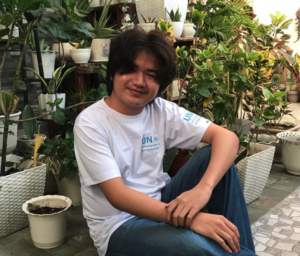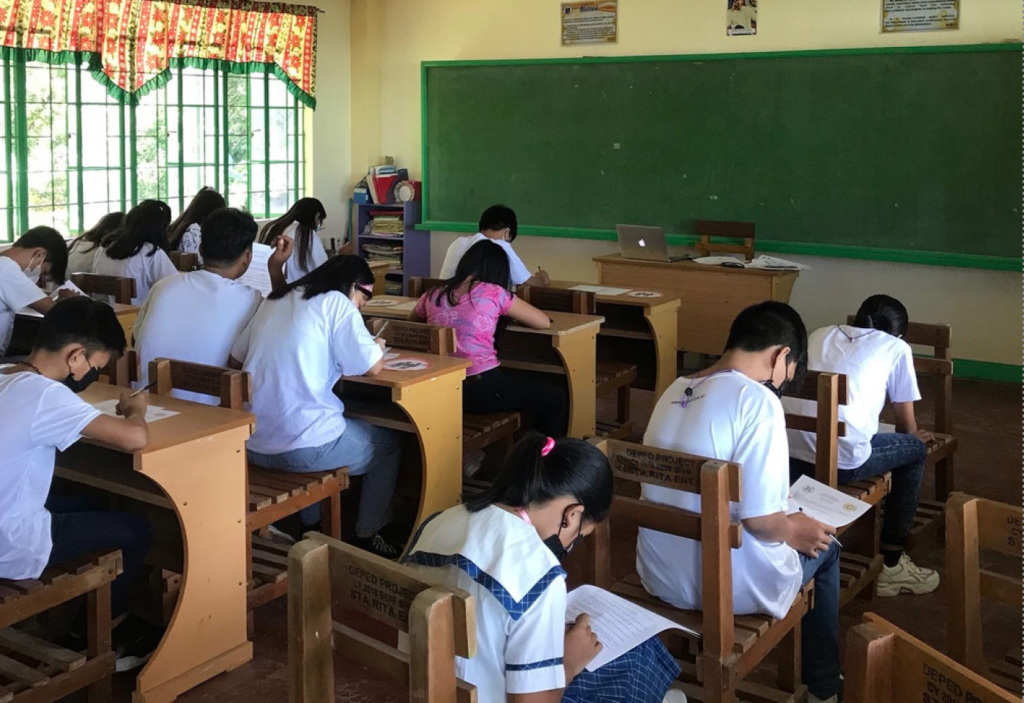I am Vhon Michael, an 18 years old climate, education, food systems, and equality activist and writer from one of the most impacted islands in the world, Samar, Philippines. My country, the Philippines, is not only within the most impacted and vulnerable countries to climate change in the world, it’s also listed as one of the most dangerous places in the world for environmental defenders, climate activists, indigenous peoples, and human rights advocates who are fighting daily for the rights of the people and the environment and blocking environmentally harmful projects that are rapidly spreading.
Noting, my country and my people do not only experience and face the instant, life-threatening manifestations of the climate crisis — such as the top five strongest typhoons ever recorded, or the floods, landslides, and other disasters. The climate crisis is more than just those. We also experience the slow, drastic effects of the climate crisis on our livelihood, our health, our people, our communities, and its impacts to our food security. We experience all the wide scale, long lasting impacts that worsen the effects of the climate-induced and climate change exacerbated disasters. Moreover, my country and my region are also the world’s hotspot for marine plastic pollution. We don’t have access to any sustainable choices and we are forced to live and consume plastic daily.

Vhon Michael and his plants, 2022
On my island, our main source of income and food is fishing. Manaragat and sapyawan are unique ways of fishing and protecting the sea that can only be found in my city and community. Hence, why we are called people of the sea. These fishing techniques that date back to hundred years ago, not only involve sustainable harvesting, but also include a balanced harmony with nature and the sea, and rituals.
With the increasing negative impacts of marine plastic pollution, and the strengthening and more frequent effects of the climate crisis, we have seen a huge decline in marine species in our bays. This does not only affect our daily lives, especially having to desperately find other ways to get food. It also leaves us vulnerable during calamities wherein most of us don’t have sources and resources to prepare before the impact, and recover after.
The climate crisis is more than just headlines on international newspapers and opinion pieces of climate experts who aren’t even on the ground, on the frontlines. It’s also the blackened names in obituaries and speeches of world leaders of our dead loved ones, the impacts on our communities and ourselves — not only physical and economical, but also mental, emotional. But more than just these negative side of the effects of the climate crisis, community resistance and grassroots solidarity are also to be highlighted.

Children learning about climate change in one of Vhon Michael’s workshops
In 2020, a Harvard study revealed that over 50% of the Filipinos are unaware of climate change, despite being the country where most of the disproportionate impacts of the climate crisis hit. I would like to highlight how the lack of climate education in frontline communities, and the inaccessibility to climate information also worsens the impacts of the climate crisis in countries like the Philippines and many other nations in the global South . Many, if not all, current education resources here are only in English, and some are in Filipino. The Philippines is a country with over a hundred spoken languages, and this means that many communities, especially marginalized, frontline and less fortunate communities are being left behind by the current educational system. And many Filipinos do not have the privilege or luxury to go to school.
Not only our current climate educational resources are available only in English, they also contain scientific jargons and terms that may not be familiar to those who have not been able to go to school, making our current climate information exclusive to those who speak a certain language, and have gone to school. In my years of visiting communities and teaching less fortunate kids and engaging in conversations with communities, especially unreachable farflung ones, I have learned that many people learn through many different mediums. Climate information only being available in text makes climate education exclusive and ableist.
We have to highlight and recognize the gaps and disparities in climate education to be able to make climate information accessible to everyone. If it’s not accessible to the poor and less fortunate, it’s neither radical or revolutionary.
Transforming the climate movement and making it inclusive for activist and non activist youth and adult allies, specially those who are in the frontlines of the climate crisis. And it would mean that education is accessible to everyone. Climate education should be thought as a form of reparation, fair distribution of funding, opportunities and resources, and a safe space where we pass the mic and highlight the voices of the grassroots and frontlines. I believe that climate knowledge, when infused with first hand experience, can inspire actually radical and transformative climate solutions, where no communities or individuals are left behind. This is what climate justice looks like. Community based solutions and solutions made by frontline communities must be highlighted because I believe that those who experience the crisis first hand are closest to the solution.
My work focuses on engaging with frontline and grassroots communities, teaching kids, demanding the ban of plastic in many cities in the Philippines and the phase out fossil fuels in the country, and also advancing climate action through mobilizing youth and children. But beyond just working towards a better Philippines, I have been working on advancing climate actions and making climate education accessible in Asia, most especially in southeast Asia. Climate action is not only seen in protests, educational workshops and symposiums, or webinars.
True climate action and resistance lies with the people and communities that strengthen both the climate and social movements — and us, individually. The climate spirit lies within the heart of a passionate community that works towards making people flourish and protecting the environment.
And most often, they are the ones being left behind in climate conversations and dialogues, political processes, and international events that not only decide where the world is gonna be in the next ten years, but where my community will be and what it’s gonna be left with tomorrow.
Solidarity and resistance.
Vhon Michael is a climate activist and writer from the Philippines. As director of Zero Hour Asia and Earth Day Network Asia ambassador, he has reaching out to departments and ministries of education in Asia to incorporate climate education in the educational system of Asian countries. You can follow Vhon Michael on Instagram and Twitter.